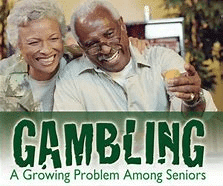
Objectives
~ Review the data about substance abuse and gambling issues in older adults
~ Review screening for substance use and mental health disorders in the elderly
~ Identify risk factors for SA and MH issues
~ Review placement and treatment issues specific to older adults
Introduction
~ Abuse of alcohol and prescription drugs among adults 60 and older; growing fast
~ Estimated 2.5 million older adults have problems related to alcohol
~ Consume more prescribed and over-the-counter (OTC) medications
~ 2006 New Jersey study indicated 23% of citizens over 55 were disordered gamblers (New Jersey Senior Gamblers Study)
~ Seniors are fastest growing group of gamblers between 1974 and 1989 (Gambling Impact and Behavior Study 1999)
~ A 2008 study reveals that they gamble for
~ Extrinsic reasons include winning money, gaining independence, and supplementing income
~ Intrinsic reasons include entertainment/excitement, being around other people, distraction from everyday problems such as loneliness and boredom, and escaping feelings of grief and loss associated with the death of a loved one or close friend. (Arizona Compulsive Gambling Council)
~ Among adults over 65 years of age gambling is the most frequently identified social activity (McNeilly & Burke 2001)
~ Reduced cognitive capacity can make it difficult for them to make sound decisions.
~ Older adults living on a fixed income with limited savings can’t necessarily afford the financial drain of a gambling disorder.
~ When you’re younger, maybe you’re $100,000 in debt, but you’ve got your spouse, you’ve got your children, your job; you still have some reason to get up in the morning,” Nower says
~ Because older adults tend to have less contact with friends and family, gambling-related problems may go unnoticed.
Gambling
~ Gambling should be identified as a problem when it disrupts, damages, or limits a person’s life
~ Signs of problem gambling are spending more money on gambling than intended; feeling bad, sad, or guilty about gambling; not having enough money for food, rent, or bills; being unable to account for blocks of time; experiencing social withdrawal; and experiencing anxiety or depression.
~ Older adults may try to hide or deny a gambling problem, they may feel hopeless or ashamed about the situation, or they may be unaware that help is available.
Alcohol and the Older Adult
~ Age-related changes affecting the way an older person responds to alcohol:
1) Normal decrease in body water that comes with age
~ Same amount can now cause intoxication
~ Increased sensitivity and decrease tolerance
2) Decrease in rate of GI metabolism
~ Blood alcohol level remains raised for a longer time
~ Increased hepatic workload
~ Trigger or worsen serious problems
~ Heart problems
~ Risk of stroke
~ Cirrhosis and other liver diseases
~ Gastrointestinal bleeding
~ Depression, anxiety and other mental health problems
The following may be signs of substance misuse (or a physical problem or medication side effects)
~ Diminished psychomotor performance
~ Impaired reaction time
~ Loss of coordination
~ Falls
~ Excessive daytime drowsiness
~ Confusion
~ Aggravation of emotional state
~ Amnesia
~ Sleep-related problems
~ Cognitive difficulties
~ Seizures, malnutrition, muscle wasting
~ Liver function abnormalities
~ Persistent irritability and altered mood, depression, anxiety
~ Unexplained complaints about chronic pain
~ Incontinence, urinary retention, difficulty urinating
~ Poor hygiene, self-neglect
~ Unusual restlessness, agitation
~ Complaints of blurred vision or dry mouth
~ Unexplained nausea and vomiting
~ Changes in eating habits
~ Slurred speech
~ Tremors, poor motor coordination, shuffling gait
~ Frequent falls , unexplained bruising
Risk Factors for the development of addiction to alcohol or gambling include:
~ Emotional and Social Problems
~ Bereavement and sadness
~ Social isolation and loneliness
~ Reduced self-regard or self-esteem
~ Family conflict and estrangement
~ Problems in managing leisure time/boredom
~ Loss of physical attractiveness
~ Loss of hearing or sight
~ Chronic pain
~ Physical disabilities; handicapping conditions
~ Reduced mobility
~ Insomnia
~ Impaired self-care
~ Dislocation from housing
~ Reduced coping skills
~ Loss of income or increased health care costs
Characteristics of effective treatment approaches for older adults
~ Age-specific group treatment
~ Supportive, non-confrontational
~ Builds or rebuilds patient's self-esteem
~ Rebuilds client's social support network
~ Staff are interested and experienced with older adults
~ Includes medical services, services for the aging and case management
5 Principles for Effective Treatment of Older Adults
~ Treat older people in age-specific settings
~ Create a culture of respect for older clients
~ Take a broad, holistic approach to treatment; emphasize age-specific psychological, social and health problems
~ Flexible treatment program
~ Adapt treatment to client’s gender
Summary
There are many issues unique to treating elders. Treatment in this population is necessary and worthwhile.
You can help clients feel at ease by providing treatment in peer settings, by persons sensitive to gerontological issues, and by clinicians of similar ages
View the Counseling CEU course for this presentation.
This course is also included in our unlimited CEU packages.
